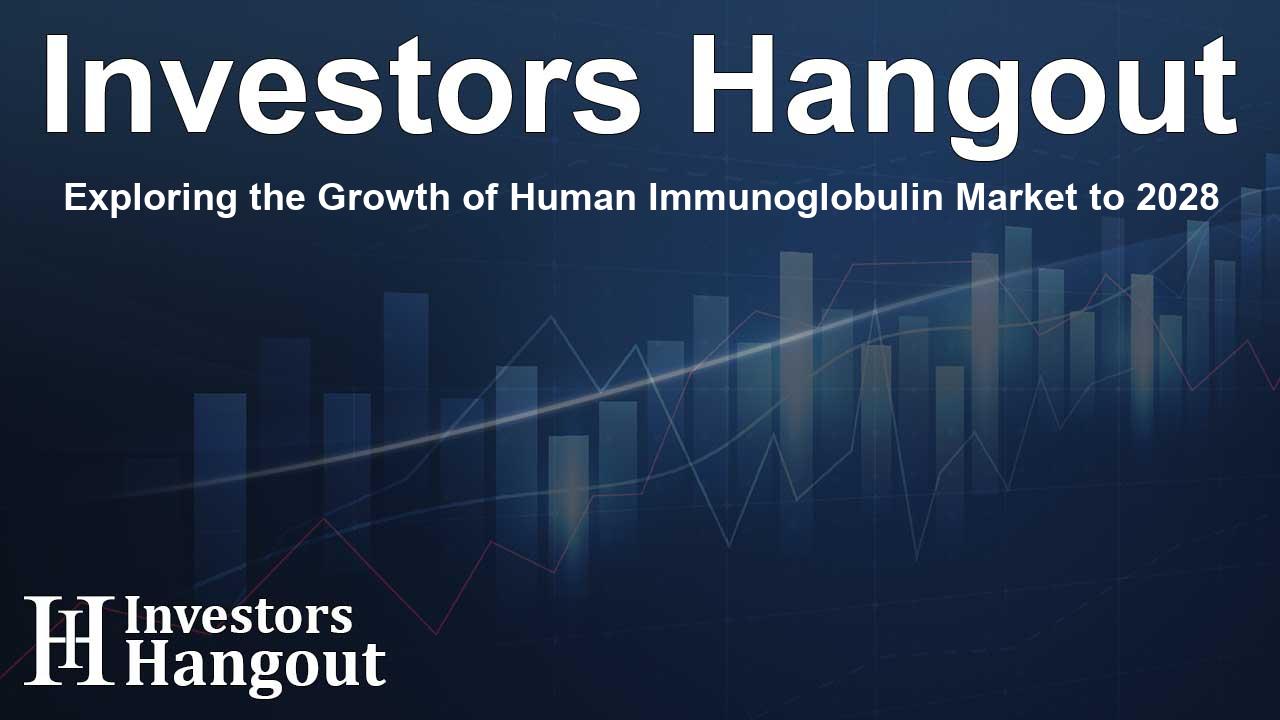Exploring the Growth of Human Immunoglobulin Market to 2028

Understanding the Potential of the Human Immunoglobulin Market
The human immunoglobulin market is set to experience remarkable growth driven by various factors. Estimated to increase by USD 9.69 billion from 2024 to 2028, the market reflects a compound annual growth rate (CAGR) of 10.11%. One of the significant factors steering this growth is the increase in plasma donations. As healthcare providers adapt to the evolving needs of patients, there is a notable trend towards substantial investments in research and development focusing on human immunoglobulin therapies.
Market Drivers and Opportunities
Innovations in Therapy
Key players in the market, such as ADMA Biologics Inc., argenx SE, Baxter International Inc., and Grifols, are expanding their portfolios through innovative therapies and formulation enhancements. These companies are actively conducting clinical trials to develop new therapies that encourage patient adherence and improve health outcomes. The demand for these therapies, particularly for treating autoimmune deficiencies, has spurred a competitive edge among firms aiming to innovate and differentiate their product offerings.
The Role of Plasma Donation
As plasma donations continue to rise, this essential resource allows for the production of life-saving human immunoglobulin therapies. Hospitals and clinics increasingly rely on Intravenous Immunoglobulin (IVIG) to treat conditions such as Guillain-Barre Syndrome and other immunological disorders. The increased availability of plasma directly supports the production of these products, ensuring that more patients have access to critical treatments.
Challenges Facing the Market
Despite the promising growth, the human immunoglobulin market does face notable challenges. The high cost associated with producing immunoglobulin therapies creates barriers for patients, particularly in low- and middle-income nations. For instance, treatment costs for a single infusion can vary significantly, averaging several thousand dollars, thus leading to substantial financial burdens on healthcare systems.
The Impact of Artificial Intelligence
AI Transforming the Industry
The integration of artificial intelligence (AI) within healthcare is revolutionizing how human immunoglobulin therapies are developed and delivered. AI is being harnessed to optimize research processes, making the development of new therapies quicker and more efficient. This technological advancement not only aids in identifying novel therapeutic targets but also enhances patient data analysis to improve treatment outcomes. The use of AI creates an environment for strategic decision-making and innovation, setting the stage for future market changes.
Future Outlook and Conclusion
Looking ahead, the human immunoglobulin market is on a trajectory of growth bolstered by emerging opportunities, despite facing challenges. Continuous advancements in plasma collection, purification techniques, and therapeutic approaches will be critical for addressing market gaps. As healthcare infrastructure improves and patient-centered care models become more prevalent, we can anticipate a rise in both patient access and compliance.
The future of human immunoglobulin therapies appears promising, and with strategic collaborations and ongoing research, the market will likely flourish. This dynamic and evolving market stands as a testament to the relentless pursuit of better health solutions, marking a significant chapter in the healthcare sector's growth narrative.
Frequently Asked Questions
What is the projected growth of the human immunoglobulin market?
The human immunoglobulin market is expected to grow by USD 9.69 billion from 2024 to 2028, reflecting a robust CAGR of 10.11%.
What are the main applications of human immunoglobulin?
Human immunoglobulin is primarily used for treating autoimmune disorders, hematological diseases, and infectious diseases through therapies like IVIG.
How does plasma donation impact the human immunoglobulin market?
The rise in plasma donations is vital for producing human immunoglobulin therapies, ensuring critical treatments are available to patients who need them.
What challenges does the human immunoglobulin market face?
The market faces challenges such as high production costs and accessibility issues, particularly in low- and middle-income countries.
How is AI influencing the human immunoglobulin market?
AI is transforming the human immunoglobulin market by streamlining research, enhancing data analysis, and improving the overall efficiency of therapy development.
About Investors Hangout
Investors Hangout is a leading online stock forum for financial discussion and learning, offering a wide range of free tools and resources. It draws in traders of all levels, who exchange market knowledge, investigate trading tactics, and keep an eye on industry developments in real time. Featuring financial articles, stock message boards, quotes, charts, company profiles, and live news updates. Through cooperative learning and a wealth of informational resources, it helps users from novices creating their first portfolios to experts honing their techniques. Join Investors Hangout today: https://investorshangout.com/
Disclaimer: The content of this article is solely for general informational purposes only; it does not represent legal, financial, or investment advice. Investors Hangout does not offer financial advice; the author is not a licensed financial advisor. Consult a qualified advisor before making any financial or investment decisions based on this article. The author's interpretation of publicly available data shapes the opinions presented here; as a result, they should not be taken as advice to purchase, sell, or hold any securities mentioned or any other investments. The author does not guarantee the accuracy, completeness, or timeliness of any material, providing it "as is." Information and market conditions may change; past performance is not indicative of future outcomes. If any of the material offered here is inaccurate, please contact us for corrections.